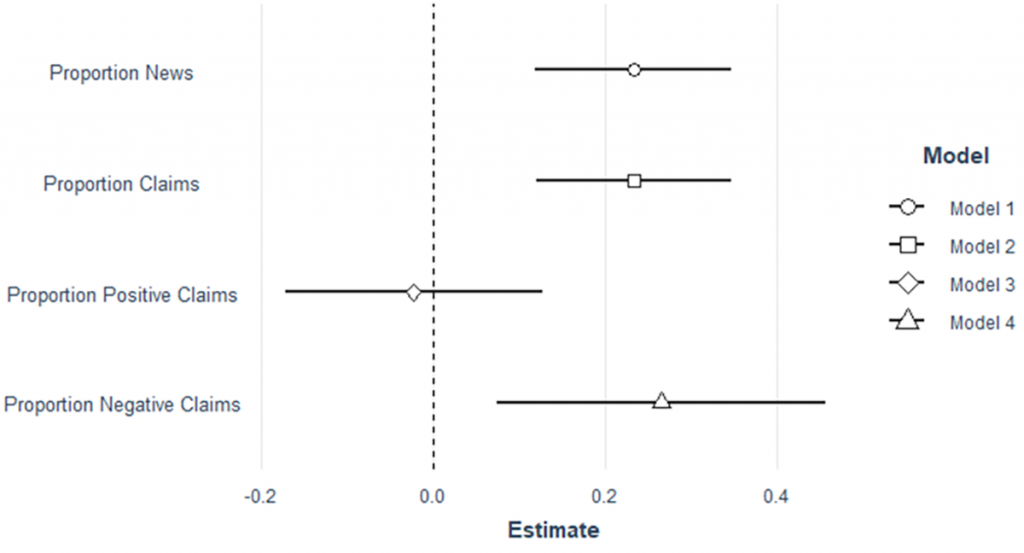Media outlets are not neutral actors in immigration debates. They shape how much we think about immigration but not our positions towards it, write João Miguel de Carvalho, Mariana Carmo Duarte and Didier Ruedin
Immigration may be on (almost) everyone’s mind, but few people have extensive experience with immigration themselves. Immigration dominates many election campaigns in Europe, yet for most voters it is a topic they know only from the television or newspapers. That makes it different from issues like education or taxes, of which all voters have personal experience. The way the media reports on immigration affects how the public thinks about the topic. Thus, it has the potential to influence elections.
So, are media outlets simply purveyors of relevant information on immigration? Or does the way the media reports the topic matter for public attitudes? To find out, we explored the relationship between media coverage and the importance people attribute to immigration, in seven Western European Union member states.
Our systematic study of news reporting about immigration in Austria, Belgium, Ireland, the Netherlands, Spain, Portugal, and the United Kingdom shows the agenda-setting effects of the media environment on public concern about immigration. Media coverage influences how much voters think about immigration, but not how they think about it.
When immigration is high on the media agenda, voters are more likely to rank it as one of the most important challenges facing their country
The volume of news and political messages made by or in the name of a collective group in national newspapers are good predictors of whether voters will rank immigration as one of the most important challenges facing their country. A higher share of negative messages coincides with an increase in the importance people attach to immigration in comparison with other policy-related issues. A higher proportion of positive messages, however, does not have similar effects; see the figure below. This suggests that messages by political actors with a negative reputation wield greater influence over public concern than messages with a positive tone.

When citizens receive a high number of news and political messages about migration, they are likely to have this topic at the top of their heads when asked about the most important issues facing their country. Citizens who come across fewer news and political messages about immigration, by contrast, seem much less concerned with immigration.
Where does this leave us in terms of politics, research, and policy more generally? Starting with politics, our results suggest that media outlets are not neutral actors in the politicisation of immigration. Indeed, the work of journalists and editors in selecting articles about immigration, and drawing public attention to the topic, has substantial repercussions for public concern about immigration.
The work of journalists and editors in drawing public attention to immigration has substantial repercussions for public concern about the issue
Our study suggests that the extent to which news outlets cover immigration as a topic – and whether they write or broadcast political messages on immigration – influences the priority people assign to this topic, irrespective of whether their political beliefs are left or right wing. In our view, this means that intense media coverage of immigration can indirectly support the normalisation and electoral expansion of political parties that heavily politicise immigration: far-right parties. Indeed, a corollary is that if mainstream parties seek to compete with far-right parties on immigration by offering voters an alternative position, they also increase the number of political messages on immigration, inadvertently increasing, rather than defusing, public concern with immigration. Thus, mainstream media can unwittingly be more friend than foe to far-right parties.
Most research on immigration control follows the so-called policy gap thesis. This posits that the public backlash against immigration is fuelled by a significant gap between the restrictive immigration policies of Western governments and the persistent development of immigration flows. We think differently. Our research challenges the role of policy gaps as the only game in town. According to our analysis, variation in the public salience of immigration is closely linked to media coverage of the topic.
Citizens tend to lack objective knowledge about the intensity of immigration, making it hard for them to judge how effectively their governments are curtailing it
Citizens tend to lack objective knowledge about the intensity of immigration. When this is the case, it becomes hard for them to assess the success of national governments in curtailing immigration. In the absence of objective knowledge, voters may rely instead on the intensity of media coverage, and the proportion of political messages on immigration, to gauge the level of immigrant inflows.
As for policy-making implications, much existing research assumes that policymakers would and should follow public demands on immigration. Our research suggests that if governments respond to increased public concern about immigration by enacting legislation, they are probably helping to maintain or even increase the visibility of immigration as a topic in the media.
Researchers often assume that greater visibility of immigration issues in the media serves to depoliticise it. We find, on the contrary, that greater visibility is likely to be counterproductive, leading instead to even greater public concern about unsustainable immigration levels. Put differently, continuous reforms of immigration policy will not appease public opinion.
It seems unlikely that public concern about immigration is a (natural) reaction to the intensity of immigration or to the observation of policy gaps. Our results show that media coverage of this social phenomenon has far greater influence on the salience of immigration than previously assumed. Media outlets, we believe, play an active role in shaping the migration debate.